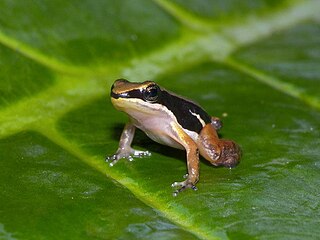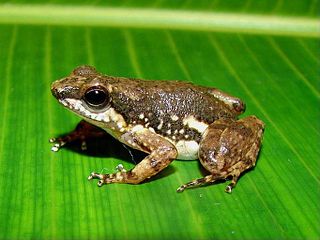
Colostethus is a genus of poison dart frogs native to Central and South America, from Panama south to Colombia, Ecuador, and northern Peru. Their common name is rocket frogs, but this name may refer to frogs in other genera and families, following the taxonomic revision of the genus in 2006.

Silverstoneia flotator, the rainforest rocket frog, is a terrestrial, diurnal frog found in humid lowlands of Costa Rica and Panama. It is considered to be of least concern by the IUCN. The taxonomy is in need of a review, as it may consist of a complex of several species.
Colostethus agilis is a species of frog in the family Dendrobatidae. It is endemic to Colombia. Its natural habitats are subtropical or tropical moist montane forests and rivers.
Leucostethus alacris or the Finca Primavera rocket frog is a species of frog in the family Dendrobatidae. It is endemic to Colombia.

Hyloxalus anthracinus is a species of frog in the family Dendrobatidae. It is endemic to Ecuador and occurs on the Cordillera Oriental and in the Mazán River, southern Ecuador.
Hyloxalus cevallosi, also known as Palanda rocket frog, is a species of poison dart frogs in the family Dendrobatidae. It is named after Gabriel Cevallos García, a famous Ecuadorean writer. This species of frog occurs on the east side of the Andes in Ecuador in the Pastaza Province. Its natural habitats are very humid premontane and pluvial premontane forests.
Hyloxalus delatorreae is a species of frog in the family Dendrobatidae. It is endemic to the western slopes of the Andes in extreme northern Ecuador.
Leucostethus dysprosium is a species of frog in the family Dendrobatidae. It is endemic to Antioquia, Colombia.
Hyloxalus exasperatus or the Yapitya rocket frog is a species of frog in the family Dendrobatidae. It is endemic to Ecuador and found on the eastern slopes of the Andes in Pastaza and Morona-Santiago Provinces. However, it is suggested that specimens from Pastaza represent a different, possibly undescribed species.

Leucostethus fraterdanieli is a species of frog in the family Dendrobatidae. It is endemic to the Andes in Colombia. Colostethus yaguara might be its junior synonym.
Leucostethus fugax, also known as Pastaza rocket frog, is a species of frog in the family Dendrobatidae. It is endemic to the eastern slopes of the Cordillera Oriental, southern Ecuador. Although originally only known from the valley of Pastaza River, it is now known to be more widespread. Its known range extends close to the Peruvian border and its true range may include Peru.
Colostethus furviventris is a species of frog in the family Dendrobatidae. It is endemic to Colombia. This frog is found on the leaf litter in cloud forests. It has been observed 1500 meters above sea level.
Colostethus imbricolus is a species of frog in the family Dendrobatidae. It is endemic to Colombia.

Colostethus inguinalis is a species of frog in the family Dendrobatidae. It is endemic to northwestern and northcentral Colombia. Its vernacular name is common rocket frog, although this name can also refer to Colostethus panamansis that until 2004 was considered a junior synonym of Colostethus inguinalis. Much of the older literature on Colostethus inguinalis is actually about Colostethus panamansis.
Colostethus jacobuspetersi, commonly known as the Quito rocket frog, is a species of frog in the family Dendrobatidae.

Colostethus panamansis, also known as the Panama rocket frog or (ambiguously) common rocket frog, is a species of poison dart frog. It is found in northwestern Colombia and Panama. It is one of the best studied poison dart frogs; however, until 2004 Colostethus panamansis was considered a synonym of Colostethus inguinalis, and consequently the older literature uses that name.
Leucostethus ramirezi is a species of frog in the family Dendrobatidae that is endemic to Colombia. It is only known from the region of its type locality, Urrao in the Antioquia Department.
Colostethus thorntoni is a species of frog in the family Dendrobatidae. It is endemic to Colombia where it is known from the Cordillera Central in the Antioquia Department.
Leucostethus yaguara is a species of frog in the family Dendrobatidae. It is endemic to Colombia where it is only known from its type locality, Ituango, on the Cordillera Occidental in the northern Antioquia Department. It might be conspecific with Colostethus fraterdanieli. Scientists observed the frog in the leaf litter near streams in cloud forest habitat are approximately 1475 meters above sea level.
Lynch's Colombian tree frog is a species of frog in the family Hylidae endemic to Colombia. Its natural habitats are subtropical or tropical moist montane forests and rivers. Scientists have seen it between 2540 and 2700 meters above sea level. It is threatened by habitat loss.






